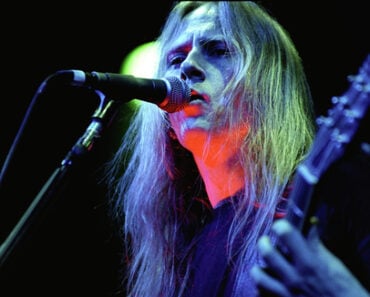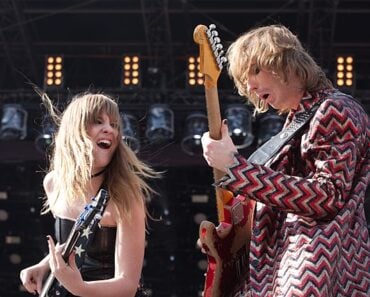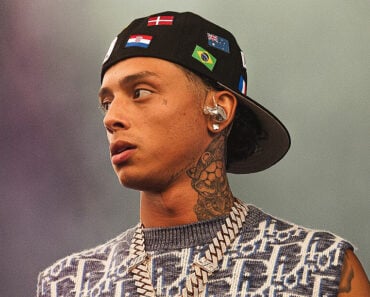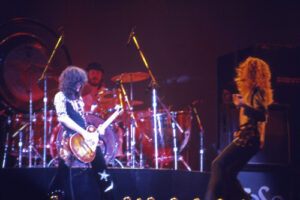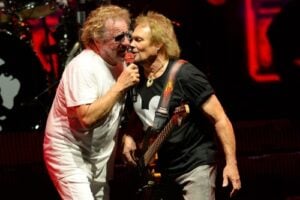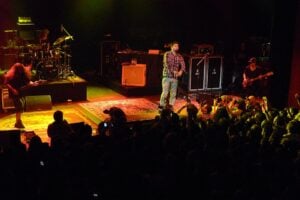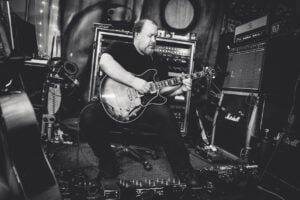
Feature Photo: Featureflash Photo Agency / Shutterstock.com
From a Victorian manor in the English countryside emerged a creative force whose career would be defined by a profound duality: the theatrical showman and the introspective artist, the technological pioneer and the humanitarian activist, the chart-topping pop star and the champion of global music. Peter Brian Gabriel’s journey from the pastoral confines of Chobham, Surrey, is not merely a story of musical success, but a chronicle of relentless innovation, artistic integrity, and an unwavering commitment to a world beyond the stage.
Born into a family that valued both the arts, through his musical mother, and engineering, through his father, Gabriel was imbued from an early age with a unique synthesis of structural thinking and expressive passion. This foundational polarity would become the central engine of his work, allowing him to construct elaborate conceptual worlds, pioneer new technologies, and build lasting institutions with the same fervor he brought to writing a deeply personal lyric or delivering a transfixing performance.
The genesis of this career began not in a gritty club but within the privileged and intellectually fertile environment of the Charterhouse School. It was here in 1965 that Gabriel, the drummer and vocalist for early school bands like the Milords, joined forces with fellow students Tony Banks, Anthony Phillips, and Mike Rutherford. Bonding over a shared ambition for songwriting, they formed a band that, under the guidance of Charterhouse alumnus and producer Jonathan King, would be christened Genesis. Their first single, 1968’s “The Silent Sun,” was a calculated pastiche of the commercially successful Bee Gees, an early indicator of a strategic awareness that coexisted with their more esoteric ambitions.
After the commercial failure of their debut album, From Genesis to Revelation, Gabriel briefly returned to his studies, but the pull of a full-time musical career proved irresistible. By 1970, he was contributing flute to Cat Stevens’ album Mona Bone Jakon and expanding his own instrumental repertoire within Genesis to include accordion and various percussion instruments, infusing the band’s burgeoning progressive rock sound with his personal love for soul music. This scholastic, project-based origin set Genesis apart, fostering a cerebral, complex approach to rock music that would lay the groundwork for a movement.
With the 1970s lineup of Genesis solidified by the arrival of guitarist Steve Hackett and drummer Phil Collins, Gabriel’s confidence as a frontman blossomed into a revolutionary form of musical theatre. Initially born from a practical problem—his discomfort at standing static during the band’s lengthy instrumental passages—he began improvising surreal and intricate stories to introduce their songs. This narrative flourish soon escalated into a full-blown visual spectacle. The turning point came in September 1972, when, on a whim, Gabriel donned his wife’s red dress and a fox’s head for a performance of “The Musical Box.” ‘
The stunt landed the band on the front page of Melody Maker, instantly elevating their profile and demonstrating the immense power of a visual statement. This was a lesson Gabriel never forgot. By the tour for the acclaimed 1973 album Selling England by the Pound, his stagecraft had evolved into an elaborate production featuring an astonishing array of costumes and characters—fluorescent makeup, bat wings, flower masks, and old man masks—each designed to bring the lyrical content of songs like “Supper’s Ready” to life. He had solved the frontman’s dilemma by transforming the rock concert into a vibrant, immersive theatrical experience, a functional innovation that became an artistic revolution.
The apex of this theatricality, the sprawling 1974 concept album The Lamb Lies Down on Broadway, also marked the end of his tenure with Genesis. Insisting on writing the entirety of the album’s complex narrative about a Puerto Rican youth named Rael, Gabriel shifted the band’s dynamic from a collaborative collective to a vehicle for his singular authorial vision. This creative friction, compounded by the personal stress surrounding the difficult birth of his first daughter, created an untenable situation. Feeling that the band was unsympathetic to his family crisis, Gabriel announced his departure during the subsequent tour, issuing a press statement titled “Out, Angels Out” that cited disillusionment with the music business.
The schism proved creatively symbiotic; it freed Genesis to pursue a more streamlined and massively successful pop direction with Phil Collins on vocals, and it liberated Gabriel to embark on a solo career defined by uncompromising experimentation. He began by releasing four self-titled albums, distinguished only by their cover art, a deliberate anti-branding statement. The first, in 1977, yielded “Solsbury Hill,” a joyous and autobiographical anthem of liberation that became his first solo hit. His artistic breakthrough came with his third album in 1980, a record on which he famously banned cymbals, forcing a percussive innovation that, with engineer Hugh Padgham, resulted in the explosive “gated reverb” drum sound. This album, featuring the anti-apartheid anthem “Biko” and the hit “Games Without Frontiers,” was initially rejected by his US label as uncommercial, a testament to the challenging, boundary-pushing nature of his new direction.
If his early solo work was an artistic rebellion, his fifth studio album, 1986’s So, was the triumphant conquest of the global mainstream on his own terms. Co-produced with Daniel Lanois, the album was a masterclass in fusing artistic depth with pop sensibility. It became his best-selling release, reaching number one in the UK and number two in the US, and spawning a cascade of iconic singles. These included the soulful plea “Don’t Give Up,” a poignant duet with Kate Bush; the rhythmically complex “Big Time”; and the enduring anthem “In Your Eyes,” later immortalized in the film Say Anything. The album’s lead single, “Sledgehammer,” a joyous horn-driven soul pastiche, not only became his first and only US number one hit but did so by knocking his former band Genesis’s “Invisible Touch” from the top spot—a moment of profound symbolic irony.
The song’s success was inextricably linked to its revolutionary music video. A collaboration with director Stephen R. Johnson and animators from Aardman Animations and the Brothers Quay, the video was a breathtaking work of stop-motion, claymation, and pixilation. It won a record nine MTV Video Music Awards in 1987, establishing a new benchmark for the music video as a parallel art form and proving Gabriel’s innate understanding that, in the 1980s, music was a profoundly visual medium.
Following the colossal success of So, Gabriel deliberately pivoted away from the pop spotlight, channeling his creative energy into new and more personal territories. He turned to film scoring, composing the evocative, world-music-infused soundtrack for Martin Scorsese’s The Last Temptation of Christ, released as the album Passion in 1989, which earned him his first Grammy Award. A decade later, he would score the Australian film Rabbit-Proof Fence, released as Long Walk Home, earning a Golden Globe nomination.
His next major studio album of songs, 1992’s Us, was a starkly introspective and somber affair, documenting the painful collapse of his first marriage and his journey through psychotherapy in tracks like the raw “Digging in the Dirt.” For this album, he again innovated, commissioning contemporary artists to create original works for each song, a precursor to the modern “visual album.” The long gaps between his major releases—a full decade passed between Us and 2002’s Up, and another two decades before 2023’s I/O—were not periods of inactivity. Rather, they were times of deliberate exploration, filled with work on multimedia projects, film scores, and his humanitarian efforts, demonstrating a career guided by artistic necessity and personal evolution rather than the relentless demands of the commercial album cycle.
Parallel to his musical evolution, Gabriel was building a legacy as a cultural entrepreneur and a crucial advocate for music from around the globe. His burgeoning interest in non-Western sounds, which had informed his own music since the early 1980s, led him to co-found the World of Music, Arts and Dance (WOMAD) festival in 1982. Recognizing that international artists lacked the infrastructure to reach Western audiences, he went further, establishing the state-of-the-art Real World Studios and the accompanying Real World Records label in Wiltshire. This was a monumental act of cultural facilitation, moving beyond mere musical appropriation to create a self-sustaining ecosystem that empowered global artists and fundamentally reshaped the listening habits of audiences worldwide.
His forward-thinking “engineer” mindset also made him a digital pioneer. He co-founded OD2, one of the first online music download services, long before the digital marketplace became standard. He delved into interactive multimedia with the award-winning CD-ROM EVE and contributed to the Myst video game series, consistently proving himself to be a prescient futurist, years ahead of the industry curve.
This drive to build structures for change found its most profound expression in his lifelong commitment to humanitarianism and political activism. A longtime supporter of Amnesty International, his anti-apartheid song “Biko” remains one of the most powerful political anthems ever written. Yet his activism went beyond lending his voice. He created practical, technology-driven solutions, most notably by launching the charity Witness in 1992, an organization that equips human rights activists with video cameras and training to document and expose abuses—a perfect synthesis of his interests.
His influence reached the highest levels of global diplomacy when he, along with Richard Branson and Nelson Mandela, developed The Elders, an independent group of global leaders dedicated to peace and conflict resolution. This work has earned him numerous prestigious honors, including the Man of Peace award from the Nobel Peace Laureates and Amnesty’s Ambassador of Conscience Award. Throughout his career, he has remained a consistent and outspoken advocate for causes ranging from proportional representation in the UK to a two-state solution for the Israeli-Palestinian conflict, using his platform to champion justice and human rights with unwavering conviction.
The ultimate legacy of Peter Gabriel is one of remarkable integration. He is the rare figure who has achieved monumental success in multiple, seemingly disparate fields, all while remaining true to a core set of principles: innovation, structural integrity, and a deep-seated humanism. His dual inductions into the Rock and Roll Hall of Fame—first with Genesis and again as a solo artist in 2014—serve as the definitive validation of his two distinct and equally significant careers, confirming that his departure from the band was a creative mitosis that spawned two legendary bodies of work.
His music continues to permeate culture, with songs like “In Your Eyes” and his haunting cover of David Bowie’s “Heroes” finding new life in films and television for new generations. Described as an “art-rock innovator, soul-pop craftsman, and ‘world music’ ambassador,” he is ultimately a creative catalyst whose influence extends through his countless collaborations and the institutions he built. With the painstaking, decades-long creation and 2023 release of his album I/O, and work already underway on a follow-up, Gabriel’s journey continues, a testament to a life spent tirelessly constructing new worlds in sound, art, and global conscience.
Complete List Of Peter Gabriel Solo Songs From A to Z
- Across the River – Music and Rhythm – 1982
- Ain’t That Peculiar (Live) – The Bristol Recorder 2 – 1981
- And Still – I/O – 2023
- And Through the Wire – Peter Gabriel – 1980
- Animal Magic – Peter Gabriel – 1978
- Animal Nation – The Wild Thornberrys Movie – 2002
- Après Moi – Scratch My Back – 2010
- At Night – Birdy – 1985
- The Barry Williams Show – Up – 2002
- Be Still – Peace Together – 1993
- Before Night Falls – Passion – 1989
- Big Time – So – 1986
- Biko – Peter Gabriel – 1980
- Biko (Live) – The Secret Policeman’s Third Ball – 1987
- Biko (Live) – Woodstock ’94 – 1994
- Birdy’s Flight – Birdy – 1985
- Blood of Eden – Us – 1992
- The Book of Love – Scratch My Back – 2010
- The Book of Love – Shall We Dance? – 2004
- The Boy in the Bubble – Scratch My Back – 2010
- Bread and Wine – Passion – 1989
- Brimstone – Real World Notes E-CD #7 – 1998
- Burn You Up, Burn You Down – Hit – 2003
- Burn You Up, Burn You Down – Big Blue Ball – 2008
- Close Up – Birdy – 1985
- Cloudless – Long Walk Home – 2002
- Come Talk to Me – Us – 1992
- The Court – I/O – 2023
- Courage – So 25th Anniversary Box Set – 2013
- Crossing the Salt Pan – Long Walk Home – 2002
- D.I.Y. – Peter Gabriel – 1978
- Darkness – Up – 2002
- Darkness – New Blood – 2011
- A Different Drum – Passion – 1989
- Different Stories, Different Lives – Sea Monsters: A Prehistoric Adventure – 2007
- Digging in the Dirt – Us – 1992
- Digging in the Dirt – New Blood – 2011
- Disturbed – Passion – 1989
- Don’t Give Up – So – 1986
- Don’t Give Up – New Blood – 2011
- Down the Dolce Vita – Peter Gabriel – 1977
- Down to Earth – WALL-E – 2008
- Downside-Up – OVO – 2000
- Downside Up – New Blood – 2011
- Dressing the Wound – Birdy – 1985
- Drone – One World One Voice – 1990
- The Drop – Up – 2002
- Excuse Me – Peter Gabriel – 1977
- Exposure – Peter Gabriel – 1978
- The Family and the Fishing Net – Peter Gabriel – 1982
- Family Snapshot – Peter Gabriel – 1980
- Father, Son – OVO – 2000
- Father, Son – New Blood – 2011
- The Feeling Begins – Passion – 1989
- Floating Dogs – Birdy – 1985
- Flotsam and Jetsam – Peter Gabriel – 1978
- Flume – Scratch My Back – 2010
- Four Kinds of Horses – I/O – 2023
- Fourteen Black Paintings – Us – 1992
- Games Without Frontiers – Peter Gabriel – 1980
- Gethsemane – Passion – 1989
- Go Away Mr Evans – Long Walk Home – 2002
- Gracie’s Recapture – Long Walk Home – 2002
- Growing Up – Up – 2002
- The Heat – Birdy – 1985
- Here Comes the Flood – Peter Gabriel – 1977
- Here It Is – Here It Is: A Tribute to Leonard Cohen – 2022
- Heroes – Scratch My Back – 2010
- Home Sweet Home – Peter Gabriel – 1978
- Humdrum – Peter Gabriel – 1977
- Humdrum (Live) – The Bristol Recorder 2 – 1981
- I Don’t Remember – Peter Gabriel – 1980
- I Go Swimming (Live) – Hard to Hold – 1984
- I Grieve – Up – 2002
- I Grieve – City of Angels – 1998
- I Have the Touch – Peter Gabriel – 1982
- I Have the Touch (’96 Remix) – Phenomenon – 1996
- I Think It’s Going to Rain Today – Scratch My Back – 2010
- I/O – I/O – 2023
- I’m Amazing – Non-album single – 2016
- In Doubt – Passion – 1989
- In the Sun – Diana, Princess of Wales: Tribute – 1997
- In Your Eyes – So – 1986
- In Your Eyes – New Blood – 2011
- Indigo – Peter Gabriel – 1978
- Intruder – Peter Gabriel – 1980
- Intruder – New Blood – 2011
- It Is Accomplished – Passion – 1989
- Jigalong – Long Walk Home – 2002
- Kiss of Life – Peter Gabriel – 1982
- Kiss That Frog – Us – 1992
- Lay Your Hands on Me – Peter Gabriel – 1982
- Lazarus Raised – Passion – 1989
- Lead a Normal Life – Peter Gabriel – 1980
- Listening Wind – Scratch My Back – 2010
- Live and Let Live – I/O – 2023
- Love Can Heal – I/O – 2023
- Love to Be Loved – Us – 1992
- Lovetown – Philadelphia – 1994
- Low Light – OVO – 2000
- Make Tomorrow – OVO – 2000
- The Man Who Loved the Earth/The Hand That Sold Shadows – OVO – 2000
- Mercy Street – So – 1986
- Mercy Street – New Blood – 2011
- Mirrorball – Scratch My Back – 2010
- Modern Love – Peter Gabriel – 1977
- Moodoo’s Secret – Long Walk Home – 2002
- More Than This – Up – 2002
- Moribund the Burgermeister – Peter Gabriel – 1977
- Mother of Violence – Peter Gabriel – 1978
- My Body Is a Cage – Scratch My Back – 2010
- My Head Sounds Like That – Up – 2002
- The Nest That Sailed the Sky – OVO – 2000
- The Nest That Sailed the Sky – New Blood – 2011
- Ngankarrparni (Sky Blue – Reprise) – Long Walk Home – 2002
- No More Apartheid – Sun City – 1985
- No Self Control – Peter Gabriel – 1980
- No Way Out – Up – 2002
- Not One of Us – Peter Gabriel – 1980
- Not One of Us (Live) – The Bristol Recorder 2 – 1981
- Of These, Hope – Passion – 1989
- Of These, Hope – Reprise – Passion – 1989
- Olive Tree – I/O – 2023
- On the Air – Peter Gabriel – 1978
- On the Map – Long Walk Home – 2002
- 100 Days to Go – Real World Notes E-CD #9 – 2000
- Only Us – Us – 1992
- Open – Passion – 1989
- Out Out – Gremlins – 1984
- Panopticom – I/O – 2023
- Party Man – Virtuosity – 1995
- Passion – Passion – 1989
- Perspective – Peter Gabriel – 1978
- Philadelphia – Scratch My Back – 2010
- Playing for Time – I/O – 2023
- The Power of the Heart – Scratch My Back – 2010
- Powerhouse at the Foot of the Mountain – Birdy – 1985
- The Promise of Shadows – Passion – 1989
- A Quiet Moment – New Blood – 2011
- Quiet and Alone – Birdy – 1985
- The Rabbit-Proof Fence – Long Walk Home – 2002
- Red Rain – So – 1986
- Red Rain – New Blood – 2011
- The Return (Parts 1, 2 and 3) – Long Walk Home – 2002
- Revenge – OVO – 2000
- The Rhythm of the Heat – Peter Gabriel – 1982
- The Rhythm of the Heat – New Blood – 2011
- Road to Joy – I/O – 2023
- Running to the Rain – Long Walk Home – 2002
- Salala – Djin Djin – 2007
- San Jacinto – Peter Gabriel – 1982
- San Jacinto – New Blood – 2011
- Sandstorm – Passion – 1989
- Secret World – Us – 1992
- A Sense of Home – Long Walk Home – 2002
- Seven Zero – Real World CD-Extra #2 – 1996
- Shakin’ the Tree – The Lion – 1989
- Shaking the Tree – Shaking the Tree – 1990
- Shaking the Tree ’97 (Jungle Version) – Jungle 2 Jungle – 1997
- Shaking the Tree (02 Remix) – The Wild Thornberrys Movie – 2002
- Shock the Monkey – Peter Gabriel – 1982
- Signal to Noise – Up – 2002
- Signal to Noise – New Blood – 2011
- Signal to Noise – Gangs of New York – 2002
- Sketch Pad with Trumpet and Voice – Birdy – 1985
- Sky Blue – Up – 2002
- Sledgehammer – So – 1986
- Slow Marimbas – Birdy – 1985
- Slow Water – Birdy – 1985
- Slowburn – Peter Gabriel – 1977
- So Much – I/O – 2023
- Solsbury Hill – Peter Gabriel – 1977
- Solsbury Hill – New Blood – 2011
- Spiel ohne Grenzen – Ein deutsches Album – 1980
- Start – Peter Gabriel – 1980
- Steam – Us – 1992
- Stealing the Children – Long Walk Home – 2002
- Stigmata – Passion – 1989
- The Story of OVO – OVO – 2000
- Strawberry Fields Forever – All This and World War II – 1976
- Street Spirit (Fade Out) – Scratch My Back – 2010
- Summertime – The Glory of Gershwin – 1994
- Suzanne – Tower of Song – 1995
- Taboo – Natural Born Killers – 1994
- That Voice Again – So – 1986
- That’ll Do – Babe: Pig in the City – 1998
- This Is Home – I/O – 2023
- This Is the Picture (Excellent Birds) – So – 1986
- The Time of the Turning – OVO – 2000
- The Time of the Turning (Reprise)/The Weaver’s Reel – OVO – 2000
- The Tower That Ate People – OVO – 2000
- The Tower That Ate People (Remix) – Red Planet – 2000
- The Tracker – Long Walk Home – 2002
- The Tree That Went Up – OVO – 2000
- Troubled – Passion – 1989
- Under Lock and Key – Birdy – 1985
- Unlocking the Door – Long Walk Home – 2002
- The Veil – Non-album single – 2016
- Waiting for the Big One – Peter Gabriel – 1977
- Walk Through the Fire – Against All Odds – 1984
- Wall of Breath – Passion – 1989
- Wallflower – Peter Gabriel – 1982
- Wallflower – New Blood – 2011
- Washing of the Water – Us – 1992
- We Do What We’re Told (Milgram’s 37) – So – 1986
- When You’re Falling – Volume 3: Further in Time – 2001
- While the Earth Sleeps – Strange Days – 1995
- White Ashes – OVO – 2000
- White Shadow – Peter Gabriel – 1978
- Whole Thing – Big Blue Ball – 2007
- With This Love – Passion – 1989
- With This Love (Choir) – Passion – 1989
- A Wonderful Day in a One-Way World – Peter Gabriel – 1978
- Zaar – Passion – 1989
Albums
Peter Gabriel (1977): 9 songs
Peter Gabriel (1978): 11 songs
Peter Gabriel (1980): 10 songs
Peter Gabriel (1982): 8 songs
Birdy (1985): 12 songs
So (1986): 9 songs
Passion (1989): 21 songs
Us (1992): 10 songs
OVO (2000): 13 songs
Up (2002): 10 songs
Long Walk Home (2002): 15 songs
Scratch My Back (2010): 12 songs
New Blood (2011): 16 songs
I/O (2023): 12 songs
Singles/Non-album tracks: 46 songs
Check out our fantastic and entertaining Peter Gabriel articles, detailing in-depth the albums, songs, band members, and more…all on ClassicRockHistory.com
Top 10 Peter Gabriel Albums
Top 10 Peter Gabriel Songs
Peter Gabriel’s Best Covers Of Other Artist’s Songs
10 Best Covers of Peter Gabriel Songs
Read More: Artists’ Interviews Directory At ClassicRockHistory.com
Read More: Classic Rock Bands List And Directory




